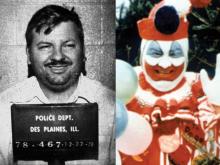Jan 25, 2003

Antoinette Frank
The psychiatrist who interviewed Antoinette Frank for the New Orleans Police Department said she was too emotionally unstable to become a police officer. He was right, but she was hired anyway. She proved to be a lousy cop and then she turned killer.
When Chau Vu saw the battered red and white Ford Torino pull into the parking lot of her family's restaurant for the third time that night – this time just before 2 a.m. – she knew something bad was going to happen. "I just had a feeling," Chau said later. "...inside, something told me it was not right."
The driver of the Torino was 24-year-old Antoinette Frank, an off-duty New Orleans police officer, who sometimes worked a uniformed, extra-duty security detail at the restaurant.
Friday night's business had been slow, and in the early hours of this cool and drizzly Saturday morning, March 4, 1995, Chau's mother had already left, leaving Chau, her older sister, and two teenage brothers to clean up the Kim Anh Vietnamese restaurant on the eastern edge of New Orleans, just a couple of miles from Lake Pontchartrain.
Dressed in a leather jacket, green blouse, and black jeans, Frank tugged on the glass door. She wanted to get in, but the door was locked. Frank had already been to the restaurant twice since her patrol shift ended at 11 p.m. On her second trip she'd brought someone she introduced as her nephew, 18-year-old Rogers LaCaze. Although LaCaze stood just 5-foot-2 and weighed 135 pounds, his mouthful of gold teeth and his attitude frightened Chau. She didn't like him.
"I always heard gangsters had gold teeth," Chau said.
Chau didn't like Frank much either. Officer Williams, who ran the security detail and scheduled the other officers, had been working at the restaurant since 9 p.m. After Frank had left the second time, Williams warned Chau that she was bad news. Williams didn't trust her, but although she wasn't authorized to work the detail, he had to sometimes use her to fill in for him or the other officers if one of them couldn't make it.
In the kitchen, 23-year-old Chau Vu was suddenly scared by Frank's sudden return. She had over $10,000 in cash spread out on a table, money her mother had borrowed to repair the plumbing and expand the parking lot. Chau grabbed all the money and stuffed it into the microwave oven. Her older sister, Ha, and 17-year-old brother, Cuong, were cleaning up the kitchen and saw where she hid the cash.
Quoc Vu, Chau's 18-year-old brother, stood behind the bar, talking with Officer Williams, who sat on one of barstools. As Frank shook the door, Quoc stepped away from the bar and yelled to his sister that the off-duty officer wanted to come in.
"Don't open the door!" Chau shouted from the kitchen.
Quoc watched as Frank unlocked the front door. She wasn't supposed to have a key to the restaurant; in fact, Quoc's sister's keys had been missing since Frank's earlier visit that evening.
With the money hidden, Chau rushed into the dinning room. Officer Williams stood up. He was just over six feet tall and weighed 225 pounds. As Frank barged into the dinning room, Williams asked her where she'd gotten the key, but she ignored him and started pushing Chau and Quoc toward the kitchen.
Officer Williams turned and had his back to the door as Rogers LaCaze slipped into the restaurant carrying a 9mm pistol in his hand.
In the kitchen, Frank said, "Chau, I need to talk to you."
"That's when I heard the shooting," Chau recalled. "Boom, boom, boom!"
LaCaze fired his first shot from close range, the muzzle of the pistol less than 18 inches from the back of Officer Williams's head.
According to the medical examiner, the trajectory was almost horizontal as the bullet severed the officer's spinal cord.
LaCaze fired again, striking Williams in the back of the neck. Then, as the officer's body tumbled toward the floor, LaCaze fired once more, the bullet tearing into Williams's back.
The killer bent over the fallen body and snatched the dead officer's pistol from its holster. Then he reached into Williams's back pocket and removed his wallet.
Frank gave Chau and Quoc one last shove, then turned and raced toward the front. Chau grabbed her brother and a restaurant employee name Vui, a 45-year-old Vietnamese woman who spoke no English, and ran toward the walk-in cooler farther back in the building. Over her shoulder, she called for Ha and Cuong to follow her, but they didn't move. Once inside the cooler, Chau and Quoc peeked through one of the glass doors and caught glimpses of Frank and LaCaze as they ransacked the kitchen. Because there was no way to lock the door from the inside, Chau's only hope was that Antoinette wouldn't think to look for them inside the cooler.
"I saw Antoinette digging in the area that we hide our money in," Quoc Vu said, "then she started running towards where my brother and sister were."
After Frank and LaCaze found the money, Frank snatched the cordless phone from its cradle at the bar. Seconds later, she stood over the kneeling forms of Ha and Cuong Vu, holding the same 9mm pistol LaCaze had just used to kill Williams. At her feet, the brother and sister held hands. They prayed and begged her not to kill them. As Quoc watched through the window of the cooler, Frank started shooting: four, five, six...10 shots total. Quoc wanted to run but Chau held him back, telling him that Frank would kill him if she saw him.
Cuong didn't die right away. "He was kind of moaning," Frank said later in a statement to homicide detectives. So she shot him again, then started looking for Chau and her brother.
According to LaCaze, when Frank couldn't find them, she looked at him and said, "One of the bitches got away."
Inside the cooler, time dragged by. Chau and the others had ducked as soon as they heard the shots, but eventually Chau stood on a rack and peeked through a window that looked out over the parking lot. A few minutes later, she saw Frank's car speeding away. After waiting several more minutes to make sure the two robbers were really gone, Chau crept out of the cooler. The restaurant was silent.
On the blood-soaked kitchen floor were Cuong and Ha Vu, both shot dead. (Cuong had been planning for a life as a Catholic priest.)
Chau kept her head low and made her way around to the bar, hoping to find Ronnie Williams, the policeman who was supposed to protect them. She found the officer behind the bar, face down on the floor.
"I saw Ronnie was lying down, with all the blood around him," Chau said.
The bar telephone was missing, but under the bar, Chau spotted her purse. In it was her new cellular phone. She grabbed her purse and ran back into the cooler. There, she dialed 9-1-1 but couldn't get through. She was terrified Frank and LaCaze would return and kill them. She called again but still couldn't reach an emergency operator. Finally, in desperation, she phoned a friend and begged him to call for help. She said, "The police officer was killed."
Quoc wanted to make sure the police were on the way. He slipped out of the restaurant and ran to a nearby friend's house to use the telephone.
Within minutes Quoc phoned 9-1-1 from his friend's house. In the recorded emergency call he repeatedly told the operator that a police officer named Antoinette and a man had come into the restaurant and started shooting everyone inside.
At the New Orleans Police Seventh District station, Officer Frank stormed through the front door. She told the desk officer that she needed to borrow a police car to respond to a shooting at the Kim Anh restaurant. She grabbed the keys to one of the marked police cars and left.
In the cooler, Chau and Ms. Vui prayed. When Chau peered outside, she saw a marked police car cruise through the parking lot, then disappear.
"There is only one police car, and then I – I still don't feel safe because I know that Antoinette is a cop." Chau's instincts were correct: Frank, with a .38 revolver tucked inside her waistband, was the first police officer to arrive. She parked her borrowed police cruiser next door at the State Farm insurance office and headed back to the restaurant.
Within a few minutes, a second car pulled into the parking lot. It was unmarked, but to Chau it looked like a police car. Two men got out. They wore police uniforms.
Chau threw open the cooler, bolted through the front door, and ran to the unmarked police car. The two uniformed officers were Wayne Farve and Reginald Jacques, both veteran detectives. They had been working an extra-duty detail nearby when the call came over the radio of a shooting at the Kim Anh. Moments later, the dispatcher upgraded the call, saying a police officer had been shot. Police cars started racing to the scene.
Farve saw a young Vietnamese woman running toward him from the restaurant being chased by a black woman. Farve recognized the second woman as a police officer.
Behind Farve and Jacques, another unmarked police car skidded to a stop in the parking lot. A female officer jumped out from behind the wheel. She was Detective Yvonne Farve, Wayne Farve's wife and an 18-year police veteran. She didn't know Antoinette Frank.
Chau spotted Yvonne Farve and dashed into her arms.
Wayne Farve stopped Frank and asked her where the perpetrators were.
"In the back," she said.
Reginald Jacques crept around to the back while Wayne Farve went through the front door. Inside they found only the victims.
Chau was nearly hysterical but wanted to check on her brother and sister. Yvonne Farve walked her inside the restaurant.
As Frank started to follow, Yvonne Farve grabbed her arm and asked who she was.
"I'm a 26," Frank answered, giving the code for a police officer. Frank then looked at Chau Vu as if seeing her for the first time that night. "Chau, what happened to your brother and sister?"
Through her tears, Chau said, "You were there. You know everything. Why you ask me that question?"
They entered the dining room and Yvonne Farve saw her husband kneeling over the body of Ronnie Williams, checking for vitals.
"He just looked at me and shook his head," Yvonne Farve said.
In the cramped kitchen, Yvonne Farve saw the bodies of Ha and Cuong Vu. Cuong lay on his side, knees pulled up to his chest. He had been shot six times, the bullets striking him in the head, chest, abdomen, right arm, and right leg. His older sister, Ha, was still on her knees, her forehead resting against the floor. She'd been shot four times, in the head, the right arm, and the right leg.
With Frank standing out of sight behind her, Yvonne Farve asked Chau who did it.
Chau said "Antoinette" and a short black man with gold teeth had come into the restaurant. "They were shooting everybody," she said.
Not recognizing the name, Yvonne asked who Antoinette was. Chau pointed behind Yvonne Farve to Officer Antoinette Frank.
Homicide investigators, Sgt. Eddie Rantz and Det. Marco Demma, arrived at the Kim Anh restaurant about 30 minutes after the shootings.
Frank told the two detectives that she'd been in the kitchen getting something to drink when she heard gunshots in the dining room. Unarmed and without a radio to call for help, she claimed to have hustled some of the restaurant workers out through the back door, then jumped in her car and raced to the police station to report the shots. Frank said that at the station she'd told the desk officer what had happened, then grabbed a police car and returned to the restaurant to help moments before the other officers arrived.
While working a homicide, one of the first things Sgt. Rantz does is get to know the crime scene. As he walked the bloody scene at the Kim Anh, he noticed that the screen door at the back of the restaurant was locked. It made him wonder about Frank's story, so he went back to her and asked about it.
"After she told me how she'd saved those kids by leading them out the back door," Rantz later said, "I asked her how she'd managed to lock the screen door from the inside."
Frank didn't have an answer.
"That's when she started talking about Rogers LaCaze," Rantz said. "I asked her if she had a gun on her. She told me no."
The detectives heard a different story from Chau and Quoc Vu, and after hearing it, Rantz walked up to the chief of police, who'd just arrived on the scene. "I told the chief, we were about to book this motherfucker (Frank) for first-degree murder."
"She told me she didn't have a gun, but I started patting her down and I found one." From Frank's waistband, Rantz pulled a .38-revolver.
Her behavior and attitude stunned even seasoned homicide detectives. "She is, without a doubt, the most cold-hearted person I've ever met," Rantz said.
Rantz sent a team of detectives to find Rogers LaCaze while he and Demma took Frank into custody, handcuffed her, and drove her to the homicide office.
On the third floor of police headquarters, where the homicide detectives are officed, Rantz and Demma interviewed Frank for several hours. In a taped statement, Frank maintained that LaCaze had killed Officer Williams, but confessed that she had killed Ha and Cuong Vu in the kitchen.
She said she had executed the brother and sister because LaCaze had made her do it. According to her statement, Rogers handed her the gun he'd shot Williams with, and pressed the dead officer's pistol against her head. If she hadn't shot the two young Vietnamese, LaCaze would have killed her.
The detectives asked why she hadn't turned the gun on LaCaze and shot him instead of killing Ha and Cuong, or why later she hadn't used her police radio – which they had found under the front seat of her car – to call for help.
All she said was, "I was too scared. I was frantic."
Explaining why he thinks Frank grabbed a police car and rushed back to the scene, Sgt. Rantz later said, "There's no doubt in my mind, she went back there to kill the rest of them."
Frank Meets LaCraze
Antoinette Frank met Rogers LaCaze the night of Nov. 25, 1994. While on patrol, Frank was one of several officers dispatched to the scene of a double shooting. LaCaze and a friend, Nemiah Miller, had both been shot during a drug deal gone bad.
"He got shot behind a dope deal," said Alice Chaney, LaCaze's mother. "Rogers and Nemiah had just scored, and the boy who shot them told them that he had to get it (the dope) from them. They thought he was joking, because he was their friend, but he shot them."
"Rogers was a dope dealer," Chaney added. "That was his crime."
Over the next few weeks the 24-year-old police officer visited the 18-year-old, small-time drug dealer in the hospital and at home. She bought him a cell phone, expensive clothes, even rented him a new Cadillac. LaCaze drove Frank's police car while she was working, he went on police calls with her, and on Feb. 4, 1995, a month before the Kim Anh murders, he jumped out of her patrol car with a Tec-9, 9mm pistol, and threatened to kill a man he'd gotten into an argument with at a party earlier that night.
The week before the robbery and murders at the Kim Anh restaurant, Frank reported her Beretta 9mm pistol stolen. LaCaze, who was at her house when a police officer arrived to take the report, later said that the gun hadn't really been stolen.
On the afternoon the day before the robbery, a couple of hours into her 3 p.m. to 11 p.m. patrol shift, Frank and LaCaze went to Wal-Mart together to buy 9mm bullets.
Two months before the robbery, New Orleans police detectives searched Officer Frank's house, looking for her brother Adam Frank Jr., a fugitive from Opelousas, La., who'd been staying with her. Adam Frank was wanted on two counts of attempted manslaughter and probation violation.
Adam Frank Sr., Antoinette's father, had also been living with her until September 1993, when she'd reported him missing. He hasn't been seen since.
Frank Becomes a Cop
Antoinette Frank had been interested in becoming a New Orleans police officer since she was 16-years-old, when she belonged to New Orleans Police Explorer Post 560. She wrote a letter expressing that desire. In it, she said:
I perceive myself to be a strong young woman with guts and who is willing to endure any obstacles to become the best law enforcement officer I can be.
But at Opelousas High School, where she graduated in 1989, the self-proclaimed "strong young woman" was a non-entity. She doesn't even appear in any of the yearbooks during her years there. Mrs. Hertz, one of her homeroom teachers remembered, "She didn't make any impression on me, good or bad."
In early 1992, Frank began her quest to become a New Orleans police officer, yet almost from the start there were problems. On both her application and during the interview with the police investigator assigned to conduct her background investigation, she spun a story about being transferred from a Wal-Mart in Opelousas to one in New Orleans, yet the Opelousas store's personnel department told the investigator that Frank had been fired for "personality conflicts with other associates" and was not eligible for rehire.
Despite the lie, the police investigator rated Frank as an acceptable police applicant.
In March 1992, as part of the application process, Frank took two widely used, standardized personality assessments. The psychologist who reviewed her test scores ranked her as "poor," the lowest score possible, in the areas of tolerance, open-mindedness, and impulse control; and ranked her as "below average" in stability, maturity, and the probability of adjusting to organizations. Among other concerns, the psychologist cited Frank's extreme lack of tolerance and flexibility, and suggested a psychiatric evaluation.
Later, at the conclusion of that evaluation, the psychiatrist who interviewed Frank rated her as unacceptable in integrity, forthrightness, and willingness to accept responsibility. The doctor concluded by saying, "I do not feel...that the applicant is suitable for the job of police officer."
For a few days in January 1993, Frank disappeared after meeting with an attorney in a downtown office building. Her father, who had been waiting for her outside, filed a missing person's report with the police after finding a note his daughter had left behind that said, "I was doomed since the day I was born...I hate myself and my life."
But Frank did eventually turn up, and two weeks later the New Orleans Police Department hired her. In July 1993, she graduated from the Police Academy and was issued New Orleans police badge No. 628.
According to her patrol supervisor and other officers who worked with her, Frank was a lousy cop.
The Trials
Because of the case's high profile, and the international media attention it had garnered, the New Orleans district attorney decided to try LaCaze and Frank separately. LaCaze went to trial first. In a risky move, he took the stand in his own defense, attempting to recant the taped confession he had given to detectives.
"They beat me," he said. "The inside of my mouth was busted. That's documented at Central Lock Up."
He admitted he'd been at the restaurant earlier with Frank, but said he was across town shooting pool with his brother when the robbery took place.
But, according to a statement his brother gave to the police, LaCaze told him "Antoinette really fucked up." Rogers admitted to his brother that they had planned the robbery for about a week, that he had shot the policeman, but said Frank had shot the other two.
The jury heard the taped statement LaCaze had given to detectives the morning after the shootings. On the tape, LaCaze explained that Frank was mad at Officer Williams.
"Ronnie always be fucking her over," he said. "He be messin' over her, and they (the Vu family) do anything he say."
According to LaCaze, "She was going to get them motherfuckers."
While LaCaze denied being at the restaurant during the shootings, the one thing he couldn't deny was that he had used Officer Williams's credit card to buy $15.29 worth of gas just 45 minutes after the murders.
Dismissing the mountain of evidence against his client, Willie Turk, LaCaze's defense attorney, said after the trial, "If Rogers had not used that credit card, he would have gotten off."
In July 1995, just four months after the gruesome murders, the jury found LaCaze guilty of three counts of first-degree murder and sentenced him to death by lethal injection.
From his tiny cell on death row, LaCaze still maintains his innocence, claiming he is as much a victim as Ronald Williams, and Ha and Cuong Vu.
While in prison, Rogers received a note from Frank. It was short, and said only, "Stick to your innocence. I'm proud of you. God keep you."
Antoinette Frank's trial began six weeks after LaCaze's ended. During her trial, the jury toured the murder scene. In the kitchen, Det. Marco Demma showed jury members where they'd found the bodies of Ha and Cuong Vu. "You can see it is a small confined area, and the bodies were close together on the floor..."
After the state presented its case, Frank's defense team rested without calling any of their 39 potential witnesses, or introducing any evidence.
In October 1995 the jury sentenced Frank to death for the murders of Officer Ronald Williams and Ha and Cuong Vu.
A month after the jury sentenced Frank to die by lethal injection, a dog uncovered human bones under the house where she lived with her father, whom she had reported missing two years before.
Experts who examined the remains – an arm, a leg, sections of spine, and a skull – have not been able to make a positive identification, but have determined that they are those of a man about the same age as Frank's father. From death row, Frank denies any knowledge of the skeletal remains, and refuses to provide DNA samples for comparison.
The skull has a bullet hole in it.
Postscript
After more than seven years as the only woman on Louisiana's Death Row, Frank continues to file appeals, claiming she is the victim of Post Traumatic Stress Disorder, both inherited from her missing father, a Vietnam War veteran, and caused by her father, whom she now claims molested her when she was a child.
In their appeals, Frank's lawyers fight for a new penalty phase and another chance in front of a jury that could change her death sentence to a life sentence.
Remarking on what could happen should Frank win an appeal, Attorney Frank Larre' said, "The best she can get is life in prison."
Frank sits in a cell at the women's prison in St. Garbiel, La., awaiting execution.
The Vu family still owns and operates the Kim Anh restaurant.
Chau Vu and Mary Williams, Officer Williams's widow, have become close friends and see each other often.
Read more on this case in the full-length book Killer With A Badge by Chuck Hustmyre, published November 2004.








